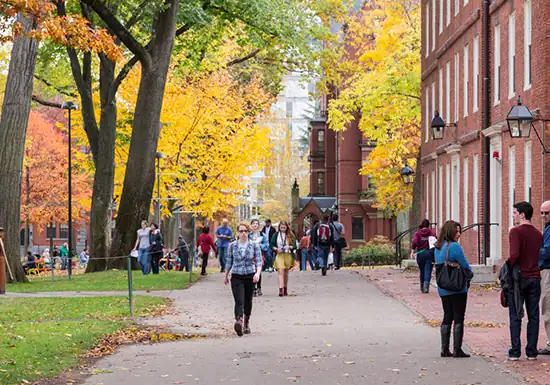10 Cheapest and Most Affordable Colleges in Massachusetts
Updated: January 8, 2026

When you think of Massachusetts, top-tier schools like Harvard and MIT probably come to mind. But what many people don’t realize is that the state also offers plenty of affordable colleges that combine strong academics with budget-friendly tuition. If you’re looking to earn a degree without taking on massive debt, Massachusetts has solid options that don’t sacrifice quality.
From public universities to smaller private institutions, many colleges in the state provide generous financial aid, low tuition for in-state students, and flexible learning formats. Whether you want to major in business, healthcare, or the arts, there’s something for everyone at a price that won’t break your budget.
This list of the 10 cheapest and most affordable colleges in Massachusetts was made to help you compare your options and find the right fit. Each school offers unique strengths, helpful support services, and a clear path to a valuable degree.
If you’re trying to balance cost with academic quality, you’ll find plenty of strong choices ahead.
Why Should You Get a Degree in Massachusetts?
Massachusetts is one of the best states in the country to go to college, especially if you’re thinking about your future career. The state is home to some of the biggest names in biotech, healthcare, and finance, including Moderna, Mass General Brigham, and Fidelity Investments. That means you’re never far from an internship, a research opportunity, or a well-paying job after graduation.
On top of that, Massachusetts schools are known for world-class academics and industry connections. Whether you’re interested in STEM, business, or the arts, you’ll find programs designed to prepare you for real-world success. Many colleges offer research opportunities, professional training, and strong alumni networks that open doors long after graduation.
The state also makes higher education more accessible through financial aid programs like MASSGrant Plus and STEM Starter Academy. These programs are designed to support students just like you, especially if you’re pursuing high-demand fields or need extra help covering college costs.
If you’re looking for a degree that sets you up for a strong future, Massachusetts is a smart place to start.

10 Most Affordable Colleges in Massachusetts
Massachusetts is renowned for its prestigious universities, but it also offers a range of affordable colleges that provide quality education without the hefty price tag. From public institutions to private colleges, students can find programs that align with their academic goals and financial circumstances.
Fitchburg State University
Fitchburg State University offers one of the lowest tuition rates in Massachusetts and provides career-focused programs rooted in public service, education, and healthcare. It’s a great choice if you’re looking for value and practical degree options.
Main Courses
- Education: Teaching licensure, curriculum design
- Business: Accounting, management, marketing
- Healthcare: Nursing, human services
Pros
- Lowest in-state tuition in the state
- Strong career development support and academic advising
Cons
- Limited graduate program offerings
- Smaller campus size may not appeal to all students
Average Annual In-State Tuition
$3,180 – One of the most cost-effective public college options in Massachusetts.
University of Massachusetts Amherst
UMass Amherst is the state’s flagship public university. It provides a diverse array of programs and research opportunities. Located in Amherst, it combines academic excellence with a vibrant campus life.
Main Courses
- Science: Biology, environmental science
- Business: Finance, operations and information management
- Liberal Arts: Sociology, communications
Pros
- Prestigious faculty and research-driven curriculum
- Broad academic offerings with strong student support
Cons
- Competitive admissions and structured course formats
Average Annual In-State Tuition
$14,100 – Reflects flagship university access at a more affordable cost than many regional peers.
University of Massachusetts Lowell
UMass Lowell is known for its strong engineering and technology programs, offering students hands-on learning experiences. Situated in Lowell, it emphasizes innovation and industry partnerships.
Main Courses
- Engineering & Tech: Information technology, mechanical engineering
- Business: Management, finance, entrepreneurship
- Healthcare: Public health, health informatics
Pros
- Strong STEM reputation and employer partnerships
- Excellent career services and job placement support
Cons
- Rigorous technical coursework may require a strong math or science background
Average Annual In-State Tuition
$15,800 – A competitive rate for a highly ranked technical and research university.
Lesley University
Lesley University is a private institution with a strong reputation in education, the arts, and counseling. Its programs are designed for students seeking creative and human-centered careers, with an emphasis on experiential learning.
Main Courses
- Education: Early childhood, special education
- Counseling: Art therapy, clinical mental health
- Arts: Visual arts, creative writing
Pros
- Personalized instruction with small class sizes
- Strong outcomes in the education and counseling fields
Cons
- Higher tuition than public colleges
Average Annual In-State Tuition
$18,500 – Reflects quality private education with a creative focus.
Northeastern University Lifelong Learning Network
Northeastern University’s Lifelong Learning Network brings Northeastern’s co-op model and global network to adult learners through online and hybrid formats. These programs are ideal for professionals seeking flexibility and career advancement.
Main Courses
- Business: Project management, analytics, finance
- Technology: Cybersecurity, data science
- Healthcare: Regulatory affairs, healthcare administration
Pros
- Extensive cooperative education and employer network
- Global learning opportunities and flexible start dates
Cons
- Premium tuition pricing for private education
Average Annual In-State Tuition
$24,900 – Reflects career-oriented private university education with built-in work experience.
Worcester State University
Located in Massachusetts’s second-largest city, Worcester State University offers a diverse array of programs and is committed to academic excellence and affordability.
Main Courses
- Education: Elementary education, secondary education
- Healthcare: Public health, nursing
- Business: Accounting, marketing, management
Pros
- Regional partnerships that support internships and job placement
- Supportive student services and advising
Cons
- Some programs have in-person or hybrid requirements
Average Annual In-State Tuition
$27,500 – A mid-range public university cost that includes access to strong academic and community resources.
Westfield State University
Westfield State University blends liberal arts with career-focused education. It’s a solid choice for students interested in criminal justice, psychology, and public service careers.
Main Courses
- Criminal Justice: Law enforcement, corrections, criminal behavior
- Business: Management, finance
- Psychology: Counseling foundations, research methods
Pros
- Strong academic advising and transfer pathways
- Active alumni network and career services
Cons
- Fewer specialized or graduate-level programs compared to larger schools
Average Annual In-State Tuition
$29,900 – A solid value for liberal arts education with practical career prep.
Bridgewater State University
Bridgewater State University offers a broad range of undergraduate programs focusing on public service and community engagement. Located in Bridgewater, it provides a supportive environment for student success.
Main Courses
- Education: Special education, educational leadership
- Social Work: Human services, counseling
- Management: Organizational leadership, operations
Pros
- Strong teaching faculty and learning support services
- Known for excellence in education and public service fields
Cons
- Selective admission for certain programs
Average Annual In-State Tuition
$30,100 – Reflects a comprehensive public university experience with strong teaching outcomes.
Endicott College
Endicott College integrates internships into every degree program, making it a strong option for students who value hands-on learning and career preparation.
Main Courses
- Business: Marketing, international business
- Nursing: RN to BSN, healthcare leadership
- Liberal Studies: Interdisciplinary programs with a customized focus
Pros
- Internship is built into every program
- Career services and strong employer relationships
Cons
- Higher cost typical of private institutions
Average Annual In-State Tuition
$36,900 – Reflects premium pricing for personalized, experience-driven education.
College of Our Lady of the Elms
Elms College is a Catholic liberal arts college that offers values-based education in high-demand fields like healthcare and business. It emphasizes personal growth, ethics, and service.
Main Courses
- Nursing: RN to BSN, healthcare leadership
- Healthcare: Health management, public health
- Business: Management, entrepreneurship
Pros
- Supportive, mission-driven learning environment
- Strong student-faculty engagement
Cons
- Higher tuition and fewer online offerings than larger schools
Average Annual In-State Tuition
$38,700 – Reflects a Catholic liberal arts education with personal attention and ethical grounding.
Tuition and mandatory fee amounts change regularly and can vary by program, course load, credit amount, and delivery format. The figures listed here reflect the latest numbers available and are intended for comparison only. Always confirm the current annual in-state tuition and required fees on the university’s official website before applying.

Key Requirements for Enrolling in the Most Affordable Massachusetts Colleges
To attend one of Massachusetts’ affordable colleges, you must meet certain admission requirements that prove both your academic readiness and state residency. These schools aim to make the process straightforward, but preparing the right documents in advance is still important.
- Submit Massachusetts Residency Proof: You’ll need to show at least 12 months of continuous residency in the state to qualify for in-state tuition. Acceptable documents include a Massachusetts driver’s license, voter registration, utility bills, or state tax returns.
- Provide Official Academic Records: Most colleges require an official high school transcript or GED certificate sent directly from your school. If you’ve attended college before, you’ll also need to submit those transcripts.
- Meet Minimum Grade Requirements: A minimum 2.0 GPA in core high school subjects is generally required, although some programs, especially in healthcare or education, may have higher standards.
- Pass Placement Assessment Tests: Before starting classes, you may need to complete placement tests in math, reading, or writing. These help determine the best starting level for your courses.
- Complete Health Documentation Forms: Massachusetts law requires students to submit immunization records and, in some cases, proof of a physical exam. Some programs, especially in nursing or education, may ask for additional screenings.
How Do Massachusetts College Costs Compare to National Averages?
Massachusetts has a reputation for expensive private universities, but its public colleges are much more affordable than many people expect. State schools like Bridgewater State and Salem State offer tuition between $11,000 and $14,000 per year, which is well below the national average of around $17,000 for public universities.
Community colleges in Massachusetts are even more budget-friendly, typically costing about $6,000 per year, which makes them a smart starting point for many students. These institutions also partner with four-year schools, making it easy to transfer and complete a bachelor’s degree at a reduced total cost.
State initiatives like the MASSGrant Plus and the John and Abigail Adams Scholarship help lower-income and high-achieving students cover tuition and fees. Even top public universities like UMass Amherst and UMass Boston maintain costs that are competitive with, or often lower than, those of other research universities across the Northeast.
What Are the Tuition Fees for International Students at Affordable Massachusetts Colleges?
If you’re an international student considering studying in Massachusetts, you’ll generally pay between $16,000 and $22,000 per year in tuition at the state’s more affordable public colleges. Schools like Fitchburg State University and Framingham State University offer competitive rates compared to other institutions in the New England region.
In addition to tuition, you’ll need to budget for:
- Mandatory health insurance (often $2,000–$3,000 per year)
- Student activity fees and materials
- Living expenses, which vary based on location but can range from $10,000 to $18,000 annually
Massachusetts schools provide a range of support services for international students, including orientation programs, academic advising, and cultural integration resources. Institutions like Salem State University and Worcester State University also offer merit-based scholarships, which can help reduce overall costs even further.
How Does the University of the People Compare with Most Affordable Colleges in Massachusetts?
University of the People (UoPeople) offers a tuition-free, fully online model that differs from Massachusetts’ traditional colleges. Instead of paying per semester, students pay a small assessment fee at the end of each course, with no upfront tuition costs.
UoPeople is accredited by the WASC Senior College and University Commission (WSCUC). In contrast, Massachusetts colleges typically hold regional accreditation through the New England Commission of Higher Education (NECHE), which is more widely accepted for credit transfers and graduate admissions.
Programs at UoPeople are self-paced and fully online, making them ideal if you need maximum flexibility. But if you’re looking for campus life, structured course delivery, or in-state career connections, Massachusetts’ affordable colleges may be the better fit.

Ready to Choose the Most Affordable College?
Choosing the right college in Massachusetts doesn’t have to mean choosing the most expensive one. With a bit of research and a clear understanding of your academic and financial goals, you can find schools that offer real value without the hefty price tag. Whether you’re leaning toward a public university like Fitchburg State or considering a private institution with strong financial aid like Lesley University, there are plenty of cost-effective options that don’t sacrifice academic quality.
As you explore your choices, keep these key factors in mind:
- Compare the total cost of attendance, not just tuition.
- Look for state-specific aid programs like MASSGrant Plus.
- Check for merit-based scholarships or institutional aid, even at private colleges.
- Consider the return on investment in terms of career outcomes and support services.
By evaluating all aspects of affordability, from academics to financial aid, you’ll be in a stronger position to make a decision that fits both your budget and your future.
FAQs
Which college has the lowest in-state tuition in Massachusetts?
Fitchburg State University offers the lowest in-state tuition, making it one of the most affordable public colleges in Massachusetts.
Are there scholarships specifically for students attending affordable colleges in Massachusetts?
Yes. Programs like MASSGrant Plus, the John and Abigail Adams Scholarship, and institutional aid help reduce costs for qualifying students.
Can out-of-state students attend affordable Massachusetts colleges at a lower cost?
Some Massachusetts colleges offer merit-based scholarships or regional tuition discounts for out-of-state students, especially from nearby states.
Do affordable colleges in Massachusetts maintain high academic quality?
Absolutely. Many public colleges in Massachusetts offer strong academic programs, experienced faculty, and solid career support, all while keeping tuition manageable.
Are there hidden fees in Massachusetts public colleges?
While tuition is predictable, students should also account for fees related to housing, labs, books, and health insurance. Most colleges clearly list these costs on their websites.
Affordable colleges in other states
- Alabama
- Alaska
- Arizona
- Arkansas
- California
- Colorado
- Connecticut
- Delaware
- Florida
- Georgia
- Hawaii
- Idaho
- Illinois
- Indiana
- Iowa
- Kansas
- Kentucky
- Louisiana
- Maine
- Maryland
- Massachusetts
- Michigan
- Minnesota
- Mississippi
- Missouri
- Montana
- Nebraska
- Nevada
- New Hampshire
- New Jersey
- New Mexico
- New York
- North Carolina
- North Dakota
- Ohio
- Oklahoma
- Oregon
- Pennsylvania
- Rhode Island
- South Carolina
- South Dakota
- Tennessee
- Texas
- Utah
- Vermont
- Virginia
- Washington
- West Virginia
- Wisconsin
- Wyoming
